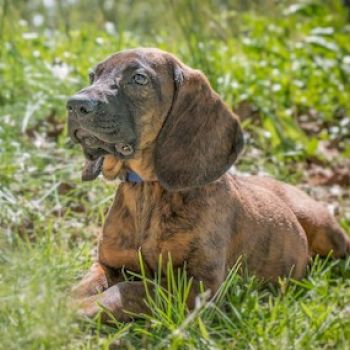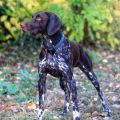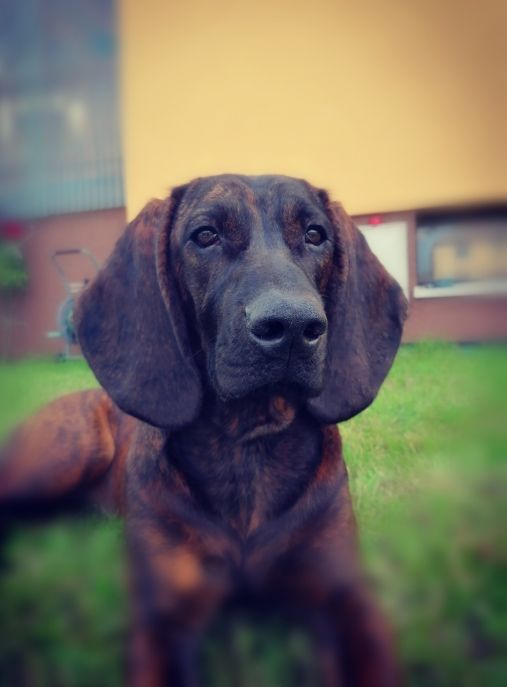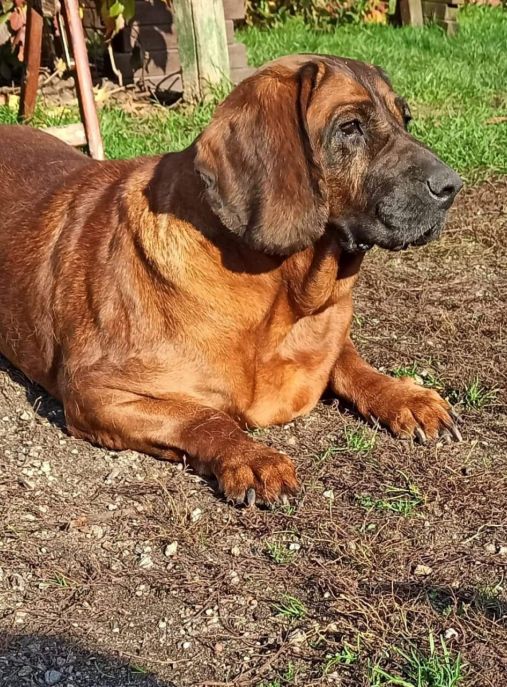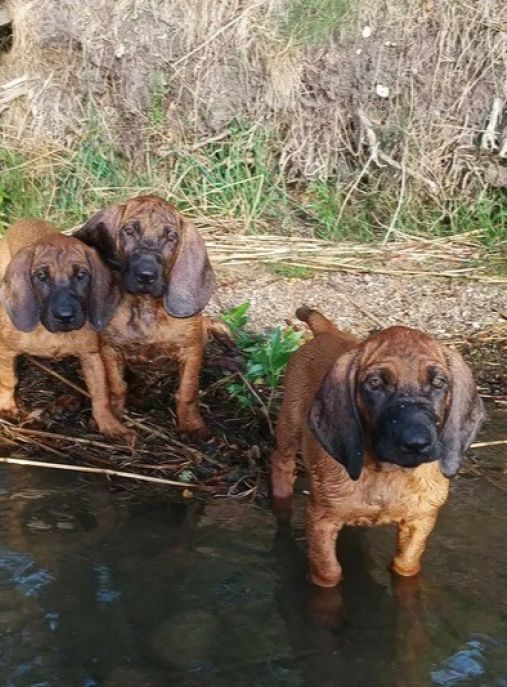The Hanoverian Scent Hound, also known as the Hanoverian Hound or Hannover'scher Schweisshund, is a remarkable dog breed that has gained recognition for its exceptional scenting abilities. This breed is widely regarded as one of the finest scent hounds in existence, with an incredible sense of smell that allows them to track scents over long distances and in challenging terrains. In addition to their olfactory prowess, Hanoverian Scent Hounds are known for their loyalty, intelligence, and gentle nature, making them excellent companions and working dogs.
The history of the Hanoverian Scent Hound can be traced back to the 19th century in Germany. It was developed by crossing various local scent hound breeds, including the Holsteiner Scent Hound, the Harz Scent Hound, and the Bavarian Mountain Scent Hound. The goal was to create a versatile hunting dog that could track wounded game and provide assistance to hunters in the densely forested regions of Hanover.
According to the FCI (Fédération Cynologique Internationale) typology, the Hanoverian Scent Hound belongs to Group 6: Scenthounds and Related Breeds. This group comprises dogs that excel in tracking scents and have been selectively bred for their exceptional olfactory abilities. The Hanoverian Scent Hound is classified under Section 1.2: Medium-sized Scenthounds.
These dogs are primarily bred for hunting purposes and are highly valued by hunters for their tracking skills. They are particularly adept at trailing wounded game, such as deer or wild boar, and can follow scent trails for extended periods. Their ability to work independently and make decisions in the field makes them indispensable to hunters.
In terms of physical characteristics, the Hanoverian Scent Hound is a medium-sized dog with a sturdy build. Males typically stand between 50-55 centimeters (20-22 inches) at the shoulder, while females are slightly smaller, measuring around 48-53 centimeters (19-21 inches). The breed's weight ranges from 30-40 kilograms (66-88 pounds), with males being slightly heavier than females.
The Hanoverian Scent Hound has a distinctive appearance with a well-proportioned body, a broad head, and a strong muzzle. Their eyes are medium-sized and have a gentle expression, reflecting their amiable nature. The breed's ears are long, hanging down close to the cheeks, and their tail is moderately long and carried with a slight curve.
One of the most fascinating aspects of this breed is its exceptional sense of smell. Hanoverian Scent Hounds possess an olfactory system that is highly developed, allowing them to detect and discriminate scents with remarkable accuracy. Their nose is large and well-pigmented, enabling them to pick up even the faintest scent trails. This extraordinary scenting ability, combined with their endurance and determination, makes them invaluable in tracking wounded game.
In terms of temperament, the Hanoverian Scent Hound is known for its friendly and gentle nature. They are generally good-natured, affectionate, and get along well with children and other animals. However, it's important to note that they have a strong hunting instinct and may exhibit a high prey drive. Early socialization and training are crucial to ensure they can coexist peacefully with other pets.
The average lifespan of a Hanoverian Scent Hound is around 10-12 years, which is relatively typical for a medium-sized breed. However, with proper care, a healthy diet, regular exercise, and routine veterinary check-ups, some individuals have been known to live even longer.
It's worth mentioning that the Hanoverian Scent Hound requires regular exercise to keep them physically and mentally stimulated. They have a moderate energy level and enjoy activities such as long walks, jogging, and exploring the outdoors. Engaging them in scent-based games or providing them with opportunities to use their tracking skills can be highly rewarding for both the dog and the owner.
In conclusion, the Hanoverian Scent Hound is a remarkable breed with exceptional scenting abilities, making them highly sought after by hunters. They possess a friendly and gentle temperament, making them excellent companions and family pets. With their medium-sized build, distinctive appearance, and incredible sense of smell, these dogs are truly a remarkable breed that continues to leave a lasting impression on all who encounter them.
The Hanoverian Scent Hound, also known as the Hanoverian Hound, is a breed of dog that possesses a unique and captivating character. With their distinctive appearance and exceptional scenting abilities, these dogs are highly regarded as skilled hunters and loyal companions. In this text, we will delve into the character of Hanoverian Scent Hound dogs, exploring their behavior, ideal training methods, and how to raise them effectively.
The character of Hanoverian Scent Hound dogs can be described as intelligent, determined, and independent. They are known for their exceptional sense of smell, which makes them excellent tracking dogs. Their ability to pick up scents and follow trails is unparalleled, making them a popular choice for hunting and search and rescue operations. This breed's strong work ethic and unwavering focus on a task make them highly reliable in various working environments.
Despite their hunting instincts, Hanoverian Scent Hounds are generally friendly and sociable dogs. They are known to be affectionate towards their family members and are particularly gentle with children. However, they may be reserved or aloof with strangers, which makes them excellent watchdogs. Early socialization is crucial to ensure they develop into well-rounded dogs that can confidently interact with different people and animals.
When it comes to training, Hanoverian Scent Hounds require a patient and consistent approach. These dogs have an independent streak and may display a stubborn nature at times. Positive reinforcement techniques, such as rewards and praise, work best with this breed. Harsh or forceful training methods are not recommended as they can lead to a breakdown in trust and hinder the dog's progress. Consistency, repetition, and engaging training sessions that stimulate their keen sense of smell will yield the best results.
Exercise is essential for Hanoverian Scent Hounds to maintain their physical and mental well-being. These dogs have a high energy level and require regular opportunities to release their pent-up energy. Long walks, jogging, or engaging in scent-based activities, such as tracking or nose work, are ideal for this breed. A securely fenced yard is recommended as they may be prone to wander off if they catch an intriguing scent.
Properly raising a Hanoverian Scent Hound involves providing them with a balanced diet, regular veterinary care, and grooming. Their short, dense coat requires minimal maintenance, with occasional brushing to remove loose hair. Regular dental care, nail trimming, and ear cleaning are also important aspects of their overall care.
In conclusion, the Hanoverian Scent Hound is a remarkable breed with a distinct character. Their intelligence, determination, and exceptional scenting abilities make them excellent working dogs. With proper training, socialization, and exercise, they can also be loving and loyal family companions. If you are considering adding a Hanoverian Scent Hound to your family, be prepared to invest time and effort into their training and care, and you will be rewarded with a devoted and remarkable canine companion.
The Hanoverian Scent Hound, also known as the Hanoverian Hound, is a versatile and intelligent breed that requires specific care to ensure their well-being and happiness. Here are some tips on how to care for Hanoverian Scent Hound dogs, including what to do and what not to do:
1. Exercise: Hanoverian Scent Hounds are active dogs that require regular exercise to stay healthy and mentally stimulated. Aim for at least 60-90 minutes of exercise daily, including brisk walks, jogging, or engaging in activities like tracking or scent work. However, avoid excessive exercise in puppies to prevent joint and bone issues.
2. Mental Stimulation: These dogs have a keen sense of smell and a strong desire to work. Engage their minds by providing puzzle toys, interactive games, and training sessions. Scent work activities, such as hiding treats or playing "find it," can be highly rewarding for them.
3. Grooming: The Hanoverian Scent Hound has a short, dense coat that requires minimal grooming. Regular brushing with a soft bristle brush will help remove loose hair and keep their coat in good condition. Bathe them only when necessary to avoid stripping their natural oils. Check their ears regularly for any signs of infection or wax buildup.
4. Socialization: Early and ongoing socialization is crucial for Hanoverian Scent Hounds. Expose them to various people, animals, and environments from a young age to help them develop into well-rounded dogs. Enroll them in puppy classes or obedience training to enhance their social skills and obedience.
5. Training: These dogs are intelligent and eager to please, making them relatively easy to train. Use positive reinforcement techniques such as treats, praise, and rewards to motivate them. Consistency, patience, and firmness are key to successful training. Avoid harsh training methods or punishment, as it can damage their trust and confidence.
6. Health Care: Regular veterinary check-ups are essential to monitor the overall health of your Hanoverian Scent Hound. Ensure they receive all necessary vaccinations, parasite prevention, and annual health screenings. Maintain a balanced diet with high-quality dog food appropriate for their age and activity level to prevent obesity and related health issues.
7. Safety: Hanoverian Scent Hounds have a strong prey drive and an excellent sense of smell, which can lead them to wander off if not properly secured. Always keep them on a leash or within a securely fenced area to prevent them from chasing scents or getting lost. Microchipping and proper identification tags are also recommended.
8. Avoid Overfeeding: These dogs have a tendency to gain weight if overfed. Follow the recommended feeding guidelines provided by your veterinarian or dog food manufacturer. Monitor their weight regularly and adjust their diet accordingly to maintain a healthy body condition.
9. Avoid Isolation: Hanoverian Scent Hounds are social animals and thrive on human companionship. Avoid leaving them alone for extended periods as it can lead to separation anxiety and destructive behaviors. Provide them with plenty of mental and physical stimulation, and consider doggy daycare or a pet sitter if you're away for long hours.
10. Be Patient: Hanoverian Scent Hounds are known for their independent nature, which can sometimes make training and obedience challenging. Be patient, consistent, and understanding during the training process. Positive reinforcement and rewards will help build a strong bond and encourage desired behaviors.
Remember, each Hanoverian Scent Hound is unique, so adapt these tips to suit your dog's individual needs. With proper care, training, and love, your Hanoverian Scent Hound will be a loyal and happy companion for years to come.
The Hanoverian Scent Hound, also known as the Hanoverian Hound, is a magnificent breed of dog that possesses a striking and distinctive coat color. These dogs are renowned for their exceptional scenting abilities and are often used for tracking and hunting purposes. While the Hanoverian Scent Hound comes in various color variations, there is a common color that is synonymous with this breed.
The most prevalent and recognizable color of the Hanoverian Scent Hound is a rich and deep shade of black and tan. The majority of these dogs have a predominantly black coat with tan markings that are strategically placed on specific areas of their body. The black coloration is typically seen on the back, sides, and head of the dog, while the tan markings are found on the muzzle, eyebrows, chest, legs, and beneath the tail.
The black coat of the Hanoverian Scent Hound is glossy and lustrous, giving the dog an elegant and regal appearance. It is often described as a jet-black color that exudes a sense of strength and power. The coat is dense and short, providing protection and insulation for the dog during various weather conditions.
The tan markings on the Hanoverian Scent Hound are a warm and earthy shade of brown. These markings are usually seen in distinct patterns, such as above the eyes, creating a beautiful and expressive look. The tan coloration also extends to the lower part of the legs, giving the dog a balanced and harmonious appearance.
One of the most striking features of the Hanoverian Scent Hound's coat is the clear and well-defined separation between the black and tan colors. This contrast creates a visually appealing and eye-catching effect, enhancing the overall beauty of the dog. The tan markings are often crisp and sharply delineated, adding to the breed's distinctiveness.
In addition to the black and tan coloration, some Hanoverian Scent Hounds may also exhibit small patches of white on their chest or toes. These white markings, although less common, add a touch of uniqueness to the breed's appearance.
The color of the Hanoverian Scent Hound's coat not only contributes to its aesthetic appeal but also serves a functional purpose. The black and tan color combination helps the dog blend into its surroundings when working in the field, making it less visible to potential prey. This natural camouflage allows the Hanoverian Scent Hound to excel in its hunting and tracking abilities.
In conclusion, the common color of the Hanoverian Scent Hound is a striking combination of black and tan. This breed's coat is predominantly black, with well-defined tan markings on specific areas of the body. The black color is glossy and powerful, while the tan markings add warmth and balance to the dog's appearance. The clear contrast between the black and tan colors enhances the breed's beauty and uniqueness. The Hanoverian Scent Hound's coat not only serves an aesthetic purpose but also aids in its hunting and tracking capabilities.
The Hanoverian Scent Hound, also known as the Hanoverian Hound, is a medium to large-sized breed known for its exceptional scenting abilities and strong hunting instincts. These dogs are generally healthy and robust, but like any other breed, they are prone to certain health issues. To ensure the well-being of your Hanoverian Scent Hound, it is important to be aware of the common diseases that affect this breed and take appropriate measures to care for their health.
One of the most prevalent health concerns in Hanoverian Scent Hounds is hip dysplasia. This condition occurs when the hip joint doesn't develop properly, leading to pain, lameness, and arthritis. Regular exercise on soft surfaces, maintaining a healthy weight, and avoiding excessive jumping or rough play during the puppy stage can help reduce the risk of hip dysplasia. Additionally, responsible breeders often screen their breeding dogs for hip dysplasia to minimize the occurrence of this condition in the breed.
Another common health issue in Hanoverian Scent Hounds is ear infections. These dogs have long, droopy ears that can trap moisture, debris, and bacteria, making them prone to infections. Regular ear cleaning with a veterinarian-recommended solution and keeping the ears dry can help prevent infections. Additionally, it is essential to check the ears regularly for signs of redness, swelling, or discharge and seek veterinary attention if any abnormalities are noticed.
Gastric dilatation-volvulus (GDV), commonly known as bloat, is a life-threatening condition that can affect Hanoverian Scent Hounds. Bloat occurs when the stomach fills with gas and twists, leading to a blockage of blood flow and potential organ damage. Feeding multiple small meals throughout the day, avoiding exercise immediately after meals, and using elevated feeding bowls can help reduce the risk of bloat. If you notice symptoms such as restlessness, unproductive vomiting, or a distended abdomen, seek immediate veterinary assistance.
Like many large breeds, Hanoverian Scent Hounds can also be prone to certain genetic disorders such as hypothyroidism, which affects the thyroid gland's ability to produce hormones. Symptoms may include weight gain, lethargy, hair loss, and skin issues. Regular veterinary check-ups, including blood tests, can help diagnose and manage this condition.
To maintain the overall health of your Hanoverian Scent Hound, it is crucial to provide them with a balanced diet that meets their nutritional needs. Regular exercise, including daily walks and mental stimulation, is also essential to keep them physically and mentally fit. Routine veterinary care, including vaccinations, parasite prevention, and dental care, is vital for their well-being.
In conclusion, while Hanoverian Scent Hounds are generally healthy dogs, they are prone to certain health issues such as hip dysplasia, ear infections, bloat, and hypothyroidism. By being aware of these conditions and taking preventive measures, such as regular exercise, proper ear care, and a balanced diet, you can help ensure the health and happiness of your Hanoverian Scent Hound. Regular veterinary check-ups and open communication with your veterinarian are crucial for early detection and management of any potential health concerns.
The Hanoverian Scent Hound, also known as the Hanoverian Hound, is a medium to large-sized breed known for its exceptional scenting abilities and strong hunting instincts. To ensure the overall health and well-being of these dogs, it is crucial to provide them with a balanced and nutritious diet. Proper nutrition plays a vital role in maintaining their energy levels, supporting their immune system, and promoting optimal growth and development.
When it comes to feeding a Hanoverian Scent Hound, it is important to choose high-quality dog food that meets their specific nutritional needs. Look for a dog food that contains a good balance of protein, carbohydrates, fats, vitamins, and minerals. Ideally, the first ingredient should be a high-quality source of animal protein, such as chicken, beef, or fish.
Protein is essential for muscle development and repair, so it should make up a significant portion of their diet. Aim for a minimum of 18-22% protein content in their food. Additionally, the food should contain a moderate amount of healthy fats, which provide a concentrated source of energy. Look for sources like chicken fat or fish oil, as they are rich in omega-3 fatty acids, which support healthy skin and coat.
Carbohydrates are an important energy source for dogs, but it is crucial to choose complex carbohydrates that provide sustained energy rather than simple sugars. Look for ingredients like whole grains (e.g., brown rice, oats) or vegetables (e.g., sweet potatoes, peas) in their food. These ingredients also provide essential fiber, aiding in digestion and maintaining a healthy weight.
It is recommended to feed Hanoverian Scent Hounds twice a day, dividing their daily food intake into two meals. This helps prevent digestive issues and keeps their energy levels stable throughout the day. The exact amount of food will depend on factors such as age, weight, activity level, and metabolism. Consult with your veterinarian to determine the appropriate portion size for your dog.
In addition to commercial dog food, you can also incorporate some fresh, whole foods into their diet. Lean meats like chicken or turkey, cooked eggs, and small amounts of fruits and vegetables can be added as occasional treats or meal toppers. However, avoid feeding them foods that are toxic to dogs, such as chocolate, grapes, onions, garlic, and avocados.
It is essential to provide clean, fresh water at all times to keep your Hanoverian Scent Hound hydrated. Regular exercise is also crucial for their overall health and weight management. Engage them in daily walks, play sessions, or activities that stimulate their natural hunting instincts.
While feeding your Hanoverian Scent Hound, it is important to monitor their weight and body condition regularly. Adjust their food portions accordingly to maintain a healthy weight. Overfeeding can lead to obesity, which can put strain on their joints and overall health.
In conclusion, a Hanoverian Scent Hound's nutrition should consist of high-quality dog food that provides a balanced mix of protein, carbohydrates, fats, vitamins, and minerals. Feed them twice a day, incorporating occasional fresh, whole foods as treats. Avoid toxic foods and monitor their weight and body condition regularly. By following these guidelines, you can ensure your Hanoverian Scent Hound receives the nutrition they need to thrive and lead a healthy, active life.

